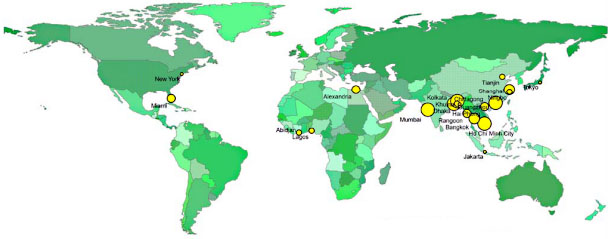Climate change is the public policy problem from hell. If you were inventing a problem that would be virtually impossible to solve, you’d give it all the characteristics of climate change: it’s largely invisibile, it’s slow moving, it’s expensive to fix, it requires global coordination, and its effects will be disproportionately borne by poor countries that nobody cares about.
That last item might seem like a harsh way of putting things, but it’s pretty much the truth. And today, via Brad Plumer, we have a new OECD report that illustrates the problem starkly. It examines which cities will have the most residents vulnerable to coastal flooding due to storm surge and high winds in 2070, and as you can see on the map below, the risk is almost entirely concentrated in developing countries in Asia and Africa. New York and Tokyo have a small bit of exposure, leaving Miami as the sole rich city with a substantial exposure. The total number of vulnerable residents will increase from 40 million today to 150 million in 2070, with the vast bulk of the increase coming in developing countries. The five riskiest cities — by a large margin — are Kolkata, Mumbai, Dhaka, Guangzhou, and Ho Chi Minh City.
Can we just adapt to this? Sure, I suppose we could, if the rich world were willing to donate enormous sums of money to these cities to finance a massive campaign of preparation and amelioration. But what are the odds of that happening? After all, the rich world isn’t even doing that in its own cities.














